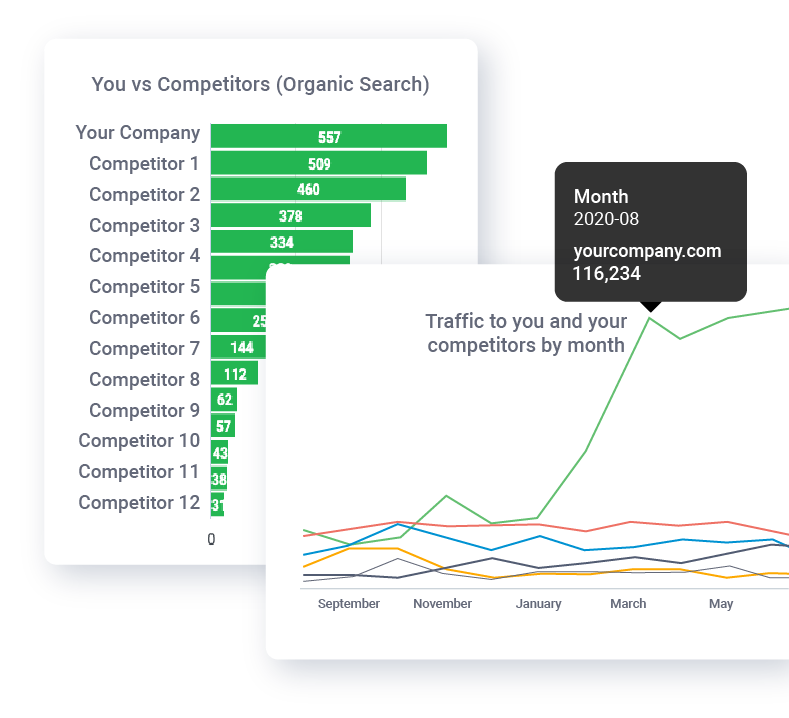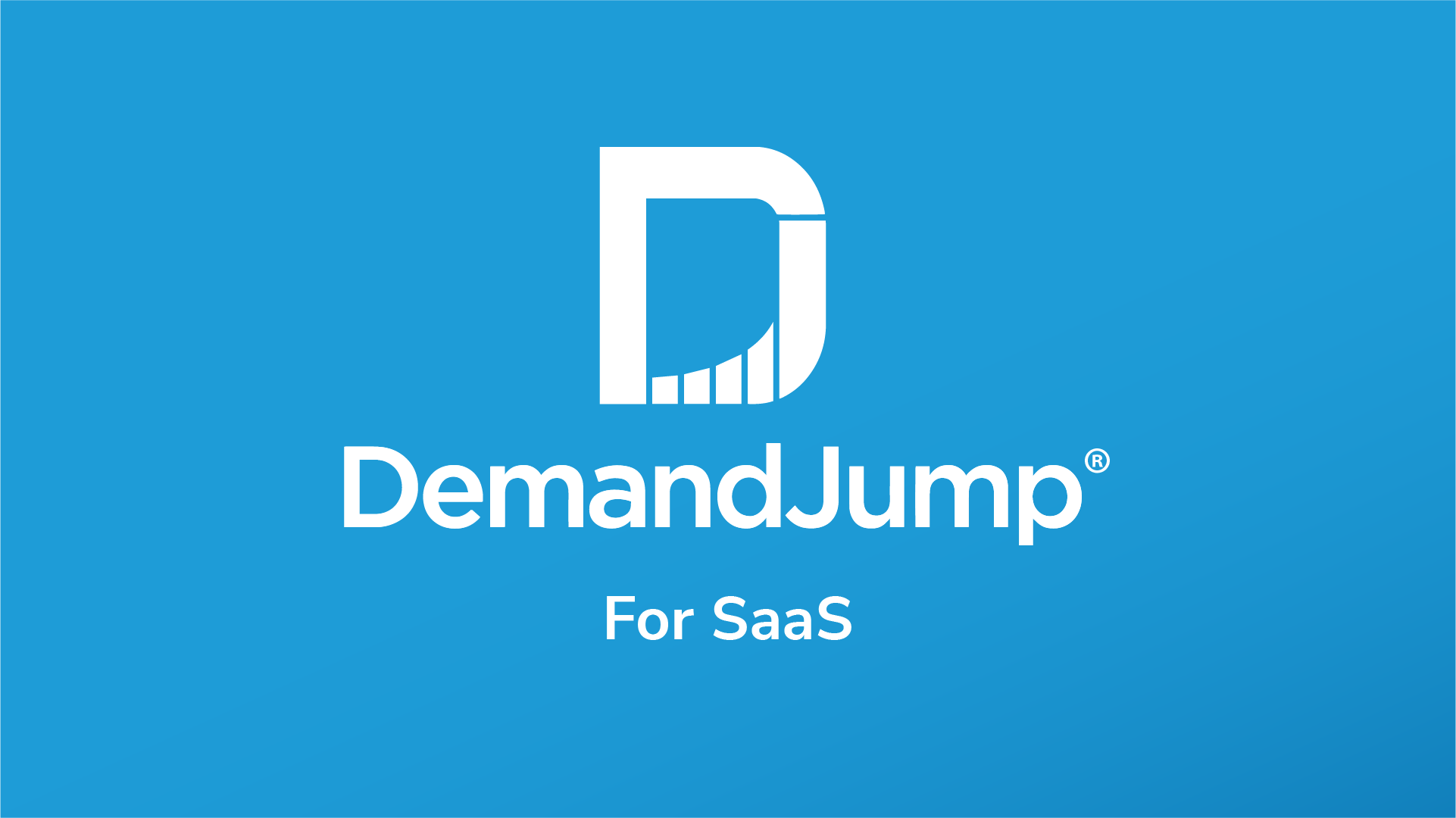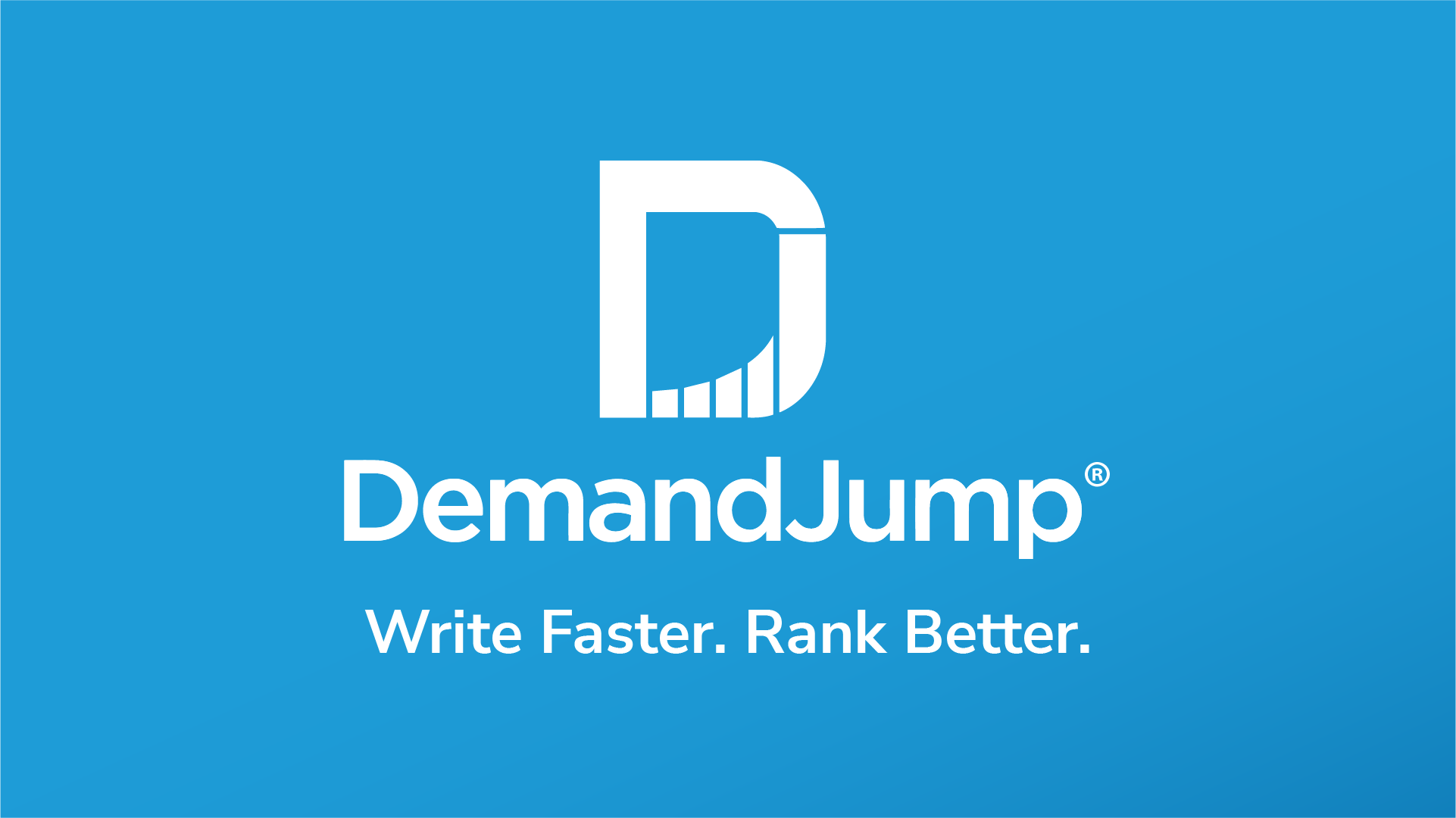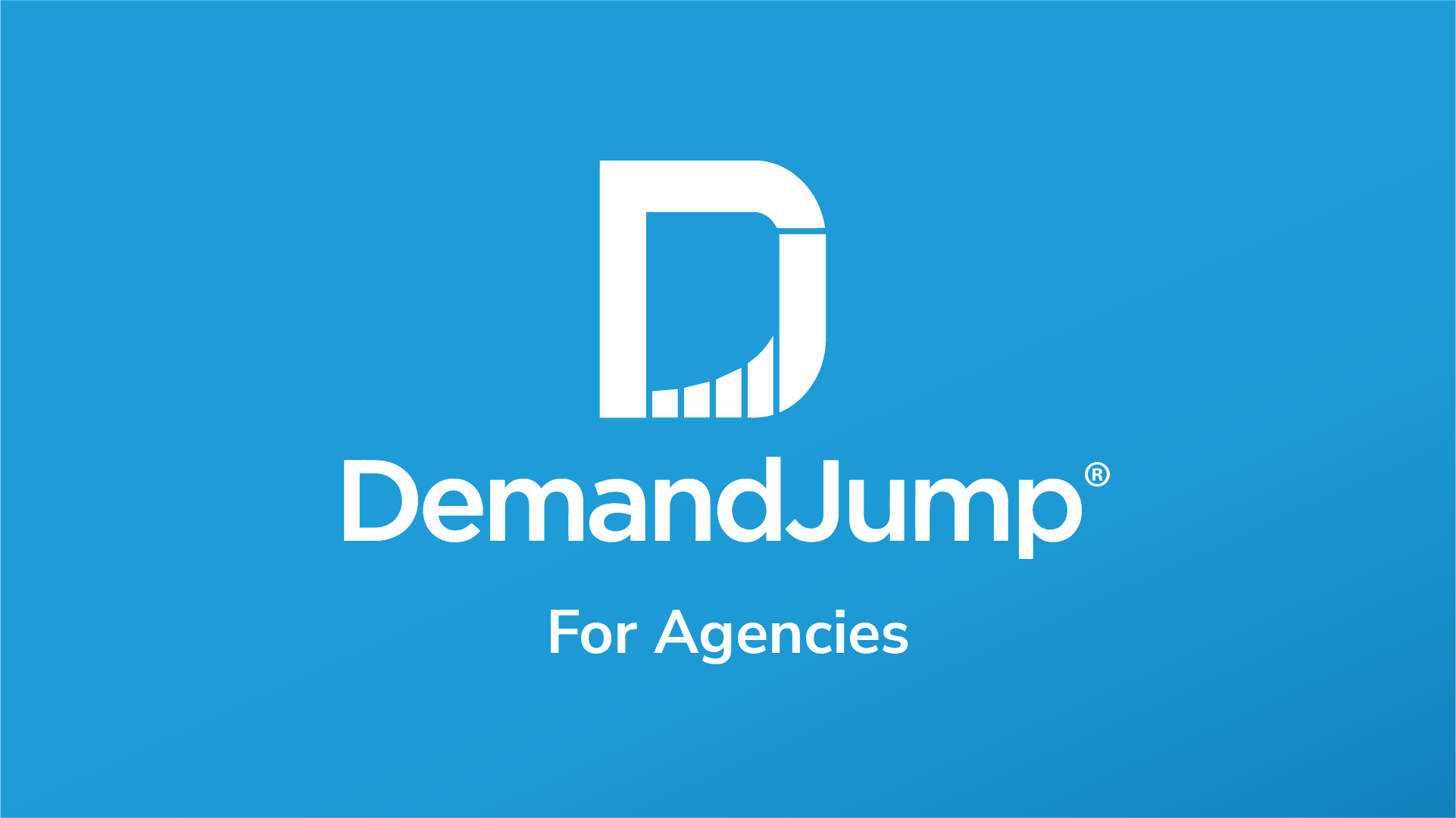See Insights in Action
By embracing DemandJump's approach to SEO, we have been able to increase our organic rankings within just 2 weeks of implementing recommendations. This helped us see a 22% increase in organic search month-over-month.
Robert Jacko Vice President Digital Marketing @ Homage
DemandJump has become a crucial extension of our marketing team, providing game changing insights to fuel and propel all aspects of our digital marketing efforts. The DemandJump platform is a must have, we are seriously impressed.
Tim Lavinder Director of Ecommerce @ Hotsox
We used to spend hours looking for insights in dozens of tools and reports. Now we log into one place to find out what customers are doing and how to meet them where it matters most.
Zach Roop Digital Marketing Manager @ Dometic
We use DemandJump recommendations as our digital to-do list. We love going in and seeing the recommendations and knowing what to do next.
JoLynda Wilson Marketing Director @ IWC
Trusted by Brands Around the World
How can I leverage competitor data to improve my content?
See what content is resonating with consumers and generating buzz online. Be part of the conversation and even capture organic traffic from your competition.
- Competitor Blog Analysis
- Competitor Content Analysis
- Competitive SEO Ranking
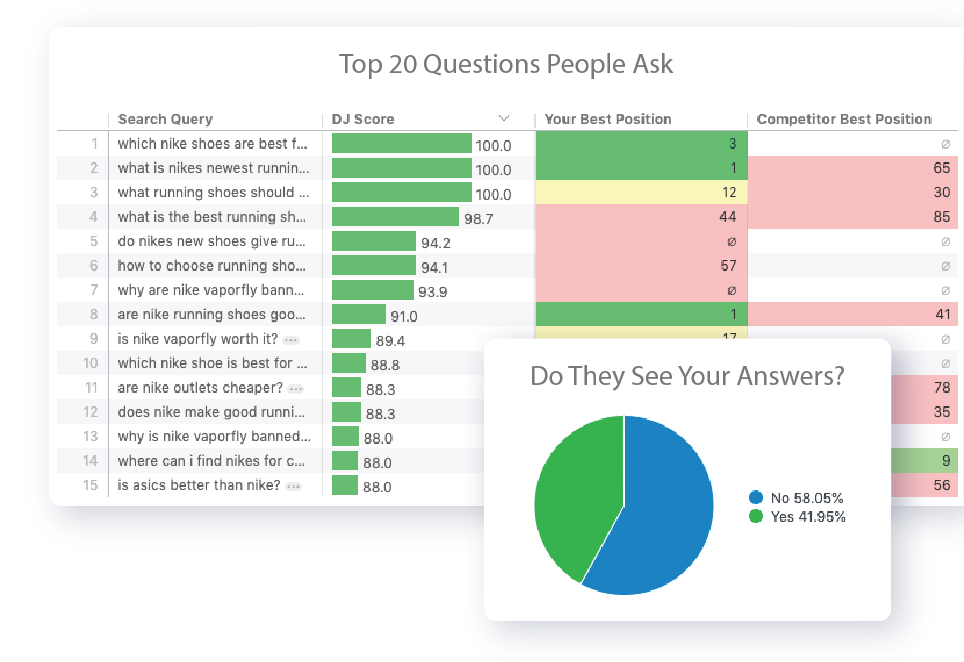
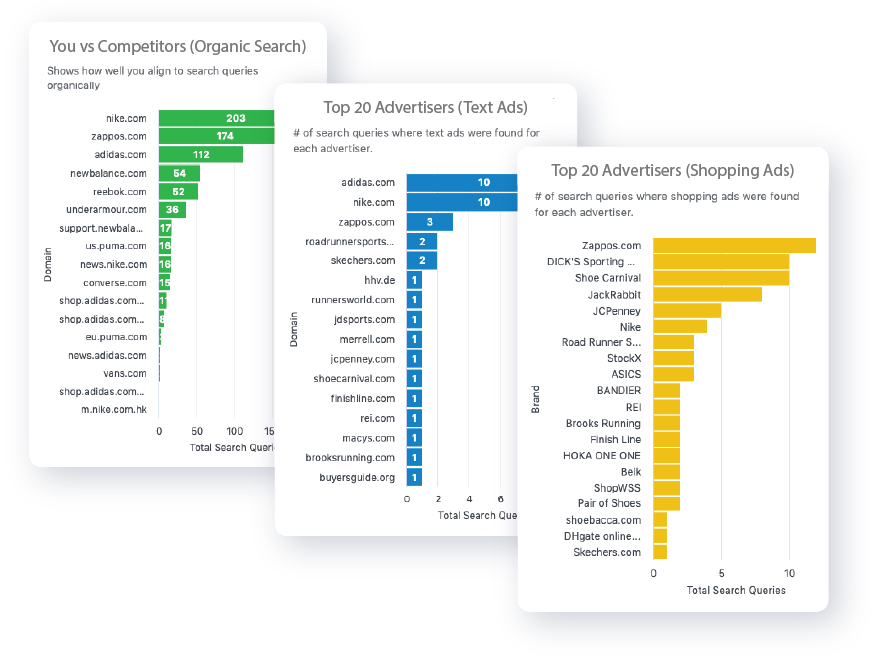
Who are my top search competitors?
Discover who's bidding on the same keywords and how they're affecting the buyer journey. Are you an industry leader? Or do you need to adjust your strategy to get ahead of the competition?
- Analyze Competitor Paid Keywords
- Analyze Competitor Organic Keywords
- Competitor Ad Analysis
- Competitor Shopping Analysis
How do my competitors generate site traffic?
Find out which channels and sources are driving traffic to the competition and uncover the best new traffic opportunities to gain the upper hand. You’ll see how you stack up and which trends change over time.
- Competitor Traffic Analysis
- Competitor Media Mix
- Competitive Gap Analysis
- Competitor Benchmarking
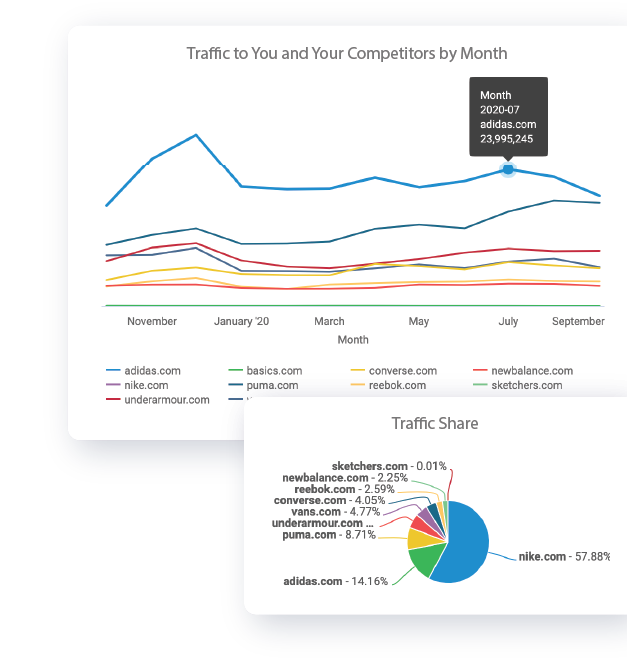
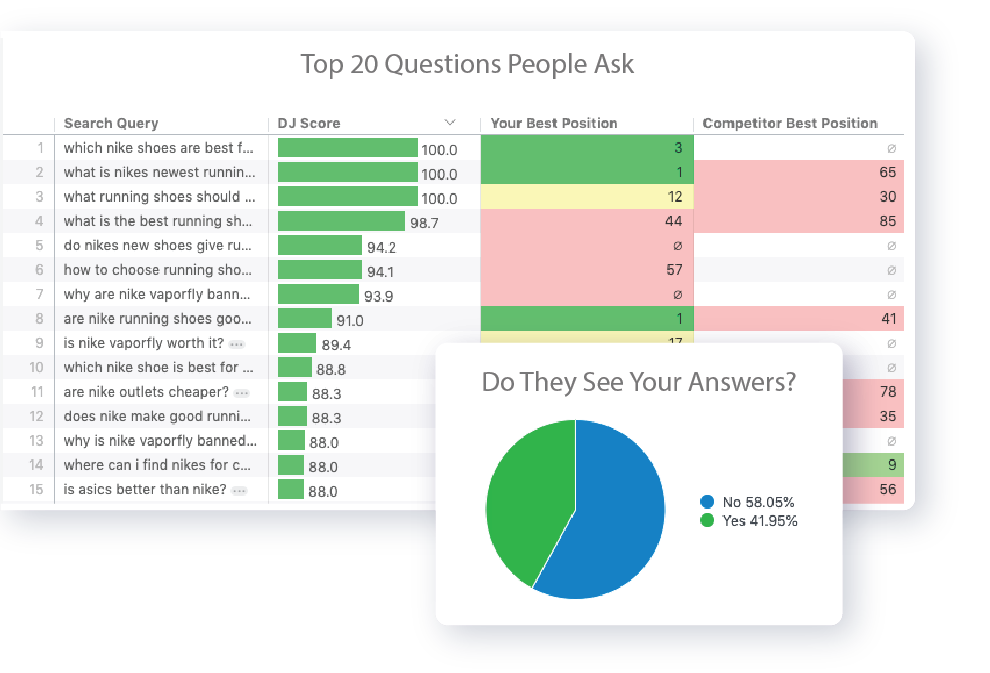
How do I set my brand apart from the competition?
Find out what people think about your brand. Once you know how they feel about your products or services, you can adjust your campaigns accordingly. Use side by side competitor ranking to see who’s leading in share of voice and uncover new ways to outmaneuver them.
- Brand Sentiment Tracking
- Brand Positioning Strategy
- Share of Voice Analysis
- Competitive Positioning Strategy
Get Free Consumer Insights Now
Market Intelligence
Today’s markets shift more rapidly than ever. While yesterday’s businesses may have gotten by with good ideas alone, today’s businesses need to be deeply connected with their target audience and competitive landscape to excel. Shifts in public sentiment or preference can send market leaders plummeting to the ground while Davids become Goliaths. That’s why identifying these shifts, and being proactive about anticipating their impacts, is more crucial than ever. That’s why your business needs market intelligence.
What is market intelligence?
Market intelligence refers to information that helps contextualize information about your own business within the larger market or business landscape. It may include insights about your target audience’s online behavior or how these individuals interact with your competitors. It could also include competitive intelligence that uncovers the number of customers they’ve acquired, and how they seem to have done so. Competitive intelligence tools can help to uncover how your competitors get their website traffic - what channels, websites, or search terms bring visitors to their site.
DemandJump’s market intelligence product pulls in data from across your entire competitive landscape to help you understand exactly what’s going on within your market. With DemandJump’s market intelligence, you can understand exactly how consumers discover your competitor’s products. By generating a snapshot of exactly what’s working for your competitors across all channels, this kind of market intelligence creates a playbook for your go-to-market strategy. Within a few clicks you can discover how to structure your search campaigns, what websites to target with your display advertisements, which affiliates you should create partnerships with, and which social platforms work best for your strategy and target market.
Importance of market intelligence
Research shows that a significant strategic fumble leads to 55% of business failures. In other words, leadership thought something was a smart move. They put their resources into it. They gave it their all. But it failed, taking their capital investments and their business with it.
Strategy that isn't based on some form of intelligence is just guesswork and we're not talking about the knowledge that lies between your ears. That's important. But this intelligence goes beyond that.
Market intelligence is data about the market in which your business exists. It's things such as the competitive landscape, customer trends and typical customer profiles. It's information about what your customers are doing, how they're finding you, and how they relate to your brand.
Often when people start businesses, they're hyper-focused on an idea and their business. But just like no person is an island, no business can stand alone.
Business exists within a market.
In order to thrive as a business, you must understand the market in which you and your business exist.
Enter market intelligence. It helps businesses make sense of their market through real, measurable data as well as through analytics and intelligence modeling. This becomes actionable data you can use to do things like:
- Increase revenue
- Cut waste in your marketing and advertising budgets
- Increase brand awareness
- Ensure you're targeting the right customers for you
- Increase how much customers spend and how often
Market intelligence can be gathered from many sources. But increasingly, it's collected from online sources because the average person spends 6+ hours online per day. Some of these sources include:
- Your website
- Social media accounts
- Online reviews sites like Yelp, WebRetailer and Google My Business (GMB)
- Your competitor's website
You might combine market intelligence with business intelligence sources like:
- Your customer relationship management software (CRM)
- Sales and customer service records
- Other internal records
What are the characteristics of marketing intelligence that these sources share? They deliver tangible, measurable, quantifiable, and qualitative data you can use to strategize, plan and implement. Through it, you continually improve your business.
The significant advantages of marketing intelligence that you can draw from it is a clear choice and instead of taking a trial and error approach to business, which would end up costing you in time and money.
Market intelligence techniques
Let's look at some examples of marketing intelligence techniques.
Let's say that competitor X is a big player in your market. You'll want to gather some market intelligence on this competitor. So you deploy tools and techniques to learn:
- What hashtags they use on social media
- What keywords they target in AdWords
- Which social media platforms they dominate and how
- What kinds of content they create on their website
- How visible they are in search engines
- What consumers they're targeting
- What they're doing with email marketing
- What they're saying about you
- How they stack up in online reviews
- What influencers, news sources, customers, regulators, etc. say about them
When you understand what the competition is doing, you can develop strategies to do it better.
Market intelligence vs. market research
Market research is the act of gathering information related to your customers' preferences in specific markets. If, for example, you have customers in Portland and also Mexico City, these customers may have different preferences, goals and needs. You may need to adapt your strategies to reach these customers based upon that research.
Often this research is done before a company has its own customer data to draw from. You may be a startup or moving into an unknown market. So you may need to get this information from many less reliable market research methods like surveys and small focus groups. Market research sites also sell access to reports they've compiled on the markets in question. You might combine this with your own research.
Finally, market research is typically historical data. It's not always as current as you'd like it to be because it takes time and effort to compile it through a marketing research process. Marketing research would have each of these three attributes but be focused precisely on how you meet marketing goals based upon these consumer preferences.
Market Intelligence, on the other hand, is real-time, actionable data about your customers, business and competition. It keeps you agile and it helps you anticipate what's ahead. That way you always know where you're going and how to get there. No guesswork required.
Industry-leading businesses utilize advanced digital marketing analytics tools to gather and analyze data from multiple vital sources at once. These channel optimization tools help you see the whole picture, and they provide you with data-driven recommendations you can use to improve your marketing strategies now.
Market Intelligence Models
Market intelligence models are an integral tool in analyzing market intelligence. These are visual representations of a collection of marketing data.
Models are important because they allow us to quickly understand what massive amounts of data (big data) are telling us. The more data that goes into that model, the more accurate it becomes.
Enough data presented in easy-to-understand models offer more confidence in your marketing strategy and business direction in general.
You're probably very familiar with statistical models. Some of the most common types of market intelligence include:
- Competitor Intelligence
- Product Intelligence
- Market Understanding
In order to properly implement market intelligence and stay agile, you must be able to quickly assess what that data is telling you. Data that is modeled and visualized shows this. When looking for a market intelligence platform, it's vital that you choose one that presents data in this way.
But how does marketing intelligence help drive marketing strategy? Let's see.
Market intelligence model example
Let's say you need to know how many times a day you need to post on Twitter to optimize engagement. You don't want to post more than you have to because at some point you'll get diminishing returns on your time spent posting.
A scatter plot could help you quickly visualize this. By making the Y-axis the number of engagements and the X-axis number of daily posts you can now plot the number of engagements you get on the day you only post once, four times, or even 10 times. At some point, you'll note that the engagement levels stay the same despite more frequent posting and now you've found your sweet spot.
Advanced analytics tools would collect all of these data sets and could continually create this scatter plot so that you could instantly see trends. Are 9 posts a day no longer getting the same number of interactions? You may need to increase them to 12, or determine if something else isn’t working with your Twitter marketing strategy.
Advanced analytics tools could further tell you if you need to post more times on a Tuesday or if you need to publish at different times.
That's market intelligence you can use to maximize your efforts.Due to the tools you use this will analyze that data and present it in a market intelligence model You could spend less time trying to make sense of data and more time moving your company in the right direction.
But before you act on what that model tells you, it's vital to understand its reliability. A model is only as good as the quality of marketing intelligence. So how can you improve that quality?
To answer that, we'll talk about jelly beans for a moment.
Market intelligence works because of something statisticians refer to the “Wisdom of the Crowd.” What is the “Wisdom of the Crowd”? Don’t worry, it's not mob rule.
It's the concept that if you ask one person the answer a question, they may or may not know the answer. But if you ask 100 people the answer and average those answers together, you'll get your right answer.
To prove this concept, one group of researchers asked 56 people to guess how many jelly beans were in a one-gallon jar. The answers were all over the place, from way over to way under to really close. But the average was within 3% of the actual number. That's the “Wisdom of the Crowd.”
In marketing, the “Crowd” is your customer data and your competitor data, whereas the "Wisdom" is the aggregate data. It may be all over the place.,but when you put it all together and look at the whole picture a story emerges. Now, that's something you can act upon.
That's the power of market intelligence.
Market Intelligence Examples
Let's look at some real companies that used market intelligence to make smart business moves.
Canadian retailer slashes inventory costs
A Canadian online retailer was able to use market intelligence to accurately predict demand for their fall line, thus cutting inventory costs by 16%. This reduced the need for discounting it also cut industrial waste, making them greener as well. They were able to use several market intelligence tools in order to track trends season-to-season and year-to-year.
Not-for-Profit increases donation
A non-profit had been struggling for years to meet donation goals. While they were generating significant interest and support, the average person donated such a low amount that it cost more to solicit and process donations than the donations made.
This company utilized market intelligence to better understand where the most substantial donations were coming from. What were the similarities among these individuals? Why did they give? When, where, how?
They were able to recalibrate their efforts to focus on givers like those giving the most. They increased the average donation per person and, therefore, the viability of their non-profit.
Online educational tools store increased purchase frequency by over 700%
This store used marketing intelligence to:
- Identify which customers came back most often
- Find out what was similar about these customers
- Target and re-target customers like them
Through this market intelligence and market research process, they were able to increase the number of repeat customers and the frequency with which they returned to buy more.
Almost any large company today is using some kind of market intelligence to drive business decisions. Among them:
- Orkin
- Airbnb
- Apple
- Blackberry
- Android
- CapitalOne
Competitive intelligence
Competitive intelligence is a specific type of market intelligence. It informs you of the competitive landscape in which your business exists. It tells how your competitors are performing. You'll know what's working for them and what isn't. If customers leave, you can track where they're going. And you'll see when you've lured customers from the competition.
Spying on the competition isn't new. For example, you might subscribe to your competitor's email. You could browse their website. You probably follow them on social media.
What's different is the tools we have today to perform this analysis faster and more thoroughly. What was once a manual process for someone just checking in with the competition is now full-time monitoring of competitors. That's without breaking any stalking laws, of course.
You can do it with very specialized competitive intelligence tools.
The goal of competitive intelligence is to provide you with actionable insight that you can use to:
- Outmaneuver
- Counteract
- Overtake
And most importantly, with competitive intelligence, you can do it with less waste of resources because you have a more precise direction. So you're not overtaking a competitor by outspending them. You do so by outsmarting them.
That's competitive intelligence.
Competitive intelligence works. An estimated 90% of Fortune 500 companies have some form of formal competitive intelligence going on with their company as well as advanced competitive intelligence analytics tools mean that any business can begin gathering and acting upon this intelligence.
Competitive Intelligence Examples
When people say the word “competitive intelligence” they may be using it to describe a wide variety of different analyses they’ve conducted on the strengths and weaknesses of their competitors.
A few examples of these analyses include analysis of, for example, a competitor’s website traffic, what search terms bring them the most traffic, where their display advertisements are showing up, what social media sites they seem to have the biggest presence on, or what affiliates they’re using to bring highly qualified visitors to their website.
Website Traffic Analysis
Analyzing your competitors’ website traffic can tell you a lot about what might work for your own business - particularly if you have the ability to monitor all of your competitors in one place. Following your competitors’ trends in website traffic can give you a better idea of when and how you should expect to see your own site performing well.
If you notice an uptick in traffic from one particular source for them, it might indicate an opportunity for your brand to get in while the getting’s good and intercept their website traffic with ads or content of your own.
Display Traffic Analysis
Understanding where your competitors are placing display advertisements, and which display advertisements are working for them, offers a huge leg up for your business. If you are new to programmatic advertising, this kind of market intelligence can give you a playbook for your own display advertising strategy instead of starting from ground zero.
We’ve found that a lot of websites where ads are placed don’t drive any performance at all for your display campaigns - as they’re often on irrelevant websites or where consumers have no intention of changing what they’re doing to explore an ad. These irrelevant display placements are what contribute to the phenomenon we all know called banner blindness.
By identifying what sites are working for your direct competitors, you can quickly whittle out irrelevant sites from your ad placement arsenal.
Social Media Analysis
Social media is an integral component of many of today’s successful businesses for a number of reasons. Posting frequently and engaging with your audience on these platforms not only helps establish brand loyalty, it’s also a quick way to disseminate information to your followers when something changes with your business.
At same time, it can be difficult to know exactly how to build your own social strategy without consulting your competitors. While there’s plenty of research out there that shares who uses what platform, it can still be difficult to identify which platform your exact audience prefers to engage on. If your target audience looks anything like your competitor’s, use social media analysis to show you how to engage with them best.
Affiliate Marketing Analysis
Affiliate marketing is a great tactic to draw in qualified audiences in the exact moment they’re in buy-mode (as long as you know the right affiliate sites to target). There’s an affiliate site for just about any niche you can imagine. Consumers now have the option to find discounts all over the internet when they’re ready to buy.
So how can you figure out where to invest your affiliate marketing spend? How do you know which partnership will deliver the greatest ROI? Oftentimes, the answer lies in a competitor analysis tool like DemandJump.
With tools like this, you can see which affiliate sites are worth investing in, specific to your unique business niche.
Search Analysis
Google is truly the front door to the internet. And as such, you should be able to find just about every business on the internet. While there are free tools to analyze consumer search behavior, one of the best ways to understand how to structure your paid search campaigns is by consulting market intelligence from the search perspective.
As with all the other examples of competitive intelligence, the use of competitive intelligence for search helps to solidify your paid search strategy - to identify which keywords to include in your own campaigns or not. You might find that your competitor is using a certain search term and it’s driving a lot of traffic to their site.
If it makes sense to use in your own campaigns, that’s great. But this might also indicate an opportunity to look elsewhere. And it might suggest you should find keywords where low competition drives down the cost of your ads.
A manufacturer increases productivity by over 30% through benchmarking
A business that tries to function as an island may find that it's recreating the wheel or working inefficiently without even knowing it. One manufacturer was able to increase their productivity by utilizing competitive intelligence to better understand the productivity of a top competitor.
Learning that their own production wasn't on par with successful companies prompted them to refine their business processes to enhance productivity.
Food packing company increases sales over 40% by optimizing marketing
A food packing company was struggling to find customers and keep them. Then they began collecting and reviewing competitive intelligence. When they did, they realized how sporadically unorganized and ineffectual their marketing efforts really were. Until they saw it being done correctly, they didn't know what they didn't know.
They revamped their entire marketing philosophy and team. They then hired the employees they needed to execute a more effective marketing strategy. They also invested in the advanced market intelligence tools they needed to compete in their competitive space.
These are real companies that use competitive intelligence and so can you.
Marketing intelligence jobs
Do you get really excited about data and analytics? Are you passionate about the data-driven decision and business strategy? You may have a future in market intelligence.
Let's look at a market intelligence job description. A market intelligence analyst employs marketing analytics tools and techniques to gather and analyze market data. The goal of a market intelligence analyst is to provide actionable insight to the business that employs their services.
A market intelligence analyst will typically work as part of a team of analysts and other marketing and growth professionals within an organization. In a smaller organization, a market intelligence analyst may also serve as a marketing manager with a dual analyst-management role.
Generally, you'll need at least a bachelor's degree in business analytics, marketing analytics, market research, market intelligence, or a related degree. MBA preferred. You can learn a lot about gathering market intelligence online. But in such a vital role, you'll most likely need a formal education. That is unless you were able to learn on the job in internships or a similar hands-on program.
According to the Bureau of Labor Statistics (BLS), a market intelligence analyst salary is around $63,000 on average, and the need for such analysts is growing faster than average. More businesses, large and small, are recognizing the vital importance of this role within their company.
So maybe you're not looking to become an analyst. But you would like to learn how to collect and use market intelligence. The best thing you can do is invest in a straightforward and easy to use tool. This tool should collect this data for you, analyze it, and present it to you in ways you can immediately use.
It should be cross-channel so that you have all of that market intelligence in one place.
It should also be user-friendly. You should never have to guess what you're missing because you don't understand how to fully use the tool.
Get the Whole Story with market intelligence you can use
Market intelligence is information about your customers and competitions that you can use to make smarter business decisions. This type of information is especially important in marketing because marketing is the face your business shows to the world. It increases brand awareness. It ensures you're sending the right message and reaching the right customers.
DemandJump has the market intelligence tool you need to get the whole story. It collects the data from multiple digital channels, analyzes it and presents it to you in a format you can actually use to make data-driven decisions for your company. Save time. Save money. Remove the uncertainty in your business decisions. Optimize everything when you base decisions on market intelligence.
Get ready to dominate the competition and better connect with your customers.
Resources
Channel Optimization
Consumer Behavior
Consumer Insights
Consumer Insights and Analytics
Competitor Analysis Tools
Content Marketing
Content Strategy
Cross-Channel Analytics
Customer Insight Research Techniques
Customer Journey Map
Market Intelligence
Marketing Analytics Techniques
Market Research
Marketing Attribution
Opportunities of Internet Marketing
Types of Consumer Insights



